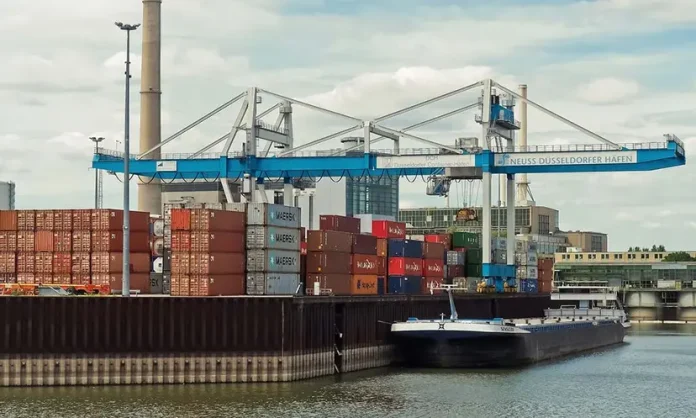Several importers and exporters of goods have urged the Gambia Government through the Gambia Ports Authority (GPA) under the Ministry of Finance and Economic Affairs to rescind the Cargo Tracking Note (CTN) charges introduced at the seaport.

The new charges, according to businesspeople will reflect high on the prices of goods consumed by the people in The Gambia.
A GPA letter dated 12th April 2023 addressed to major importers and seen by The Point states: “Please be informed that implementation of the Advanced Cargo Declaration scheme: CTN/ACD as part of the procedure for cargo security and safety in The Gambia was scheduled since the requirements for Government, Ports Authority and Shipping Companies on ISPS code (International Ship and Port Facility Security Code) in 2002.
“On the 2nd of September 2022, the government of The Gambia signed a full Cargo Tracking Note Agreement in compliance with Chapter Six (6) of the Public Authorities Law and SOLAS Chapter X1-2: The Cargo Tracking Note (Advanced Cargo Declaration management) at all Ports of entry in The Gambia, including the Port of Banjul.”
“Consequently, from 15th May 2023, every Cargo loaded or unloaded (Import/Export and Transit), at or with The Gambia as the origin/final/transit destination has to, prior of shipment, obtain a Cargo Tracking Certificate Number (ENS/ENX) and the Vessel or Carrier carrying such goods must also obtain a Movement Reference Number (MRN) from the Global Tracking and Maritime Solutions Holdings platform and produced to its representative at all ports around the world.”

The letter added that all cargos destined for or out of The Gambia (Import/Export or transit) need to be accompanied by Entry Summary Number (ENS) or an Exit Summary Number as required by the ISPS code.
In response to GPA letter, the business community issued a petition dated 26th May 2023 to the Minister of Trade and copied to several stakeholders including the Chief of Staff; Ministry of Finance and Economic Affairs; Ministry of Transport, Works and Infrastructure; Gambia Port Authority (GPA); Gambia Revenue Authority (GRA); and Gambia Chamber of Commerce and Industry (GCCI).
The petition indicated that: “We the business community of The Gambia is writing to protest in the strongest terms the implementation of the above measure for the following reasons.”
“CTN adds no value to business it is simply a tax that increases the cost of imports and exports. That cost is then passed on to the Gambian people making goods more expensive for the people. – We do not want to do this for the Gambian nation.”
“In terms of security, we have scanners at port which can tell you what is in the container. GTMS is not required.”
“If we have more costs on imported goods the cross border trade will decrease and eventually stop. The impact of this is disastrous on revenue for GRA, availability of goods, jobs for the people and for the cost of living of everyday Gambians.”
“GTMS is a company with a questionable track record. They have been kicked out of Sierra Leone for the problems CTN has caused for businesses and consumers alike. In Liberia they have also had problems.”
The statement further states that increasing costs on them affects every day Gambians as it will have no choice but to pass on these costs in order to be able to trade.
“Please we as business community with Gambian interest at heart are united in our “refusal” to work with this company,” the petition ends.
A major importer who spoke to The Point anonymously, said the importers have suffered lots of charges at the seaport including bunker recovery adjustment factory; terminal handling charge destination; Ocean carrier international ship and ports facility security; freight levy charges export; container cleaning fees; delivery order fees; terminal fee including gate in and out; container release fee and import document fees.
“In addition to all of that, we now have to add the CTN charges which will be considerably higher than all abovementioned cost,” he said.
He points out that already; prices of commodities are skyrocketing; thus, extra charges on importers will bring further hardship on Gambians.
Therefore, he called on the government to rescind the CTN, describing it unnecessary.
Alhagie Mamadi Kurang, an independent economist, described the CTN as a global trading arrangement which all modern port management system cannot go without. “Some things are part of the international order and Gambia cannot be left behind if it wants to remain competitive,” he added.
Quizzed whether the new charges will increase commodity prices, he responded saying: “I do not see how it can affect the price of commodities if the processes become faster?
However, he added that the new system alone cannot change the port efficiency, justifying that other factors like cranes and other loading equipments, skills and infrastructure must be present for this new system to be effective.
In the petition the business community argued “the impact of the CTN is disastrous on revenue for GRA, availability of goods, jobs for the people and for the cost of living of everyday Gambians.”
However, Mr. Kurang has an opposite view. He said if the new CTN makes processes faster at the ports, it can make loading and unloading faster and more efficient which can increase GPA revenue in the long run by encouraging more businesses to use the port .
“We have to remember that one of the usual complaints of importers and exporters is the processing time of cargo. If this system is going to make processing time shorter, then importers and exporters will benefit,” he said.
The Point newspaper tried to get comment from The Gambia Chamber of Commerce (GCCI) but it proved futile.


